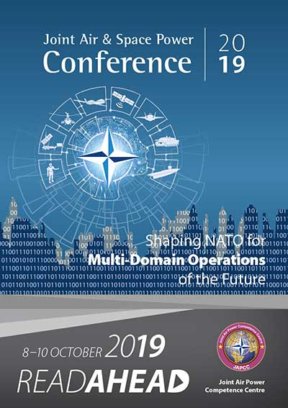Esteemed Colleagues,
It is my privilege and pleasure to serve as your moderator for this year’s JAPCC Conference.
As in previous years, the panels for this conference follow a logical progression. Panel one has the clear task of establishing a working definition of what we actually mean by the term ‘Multi-Domain Operations’ (MDO). It would not be too dramatic to say that the rest of this conference (and, certainly, the remaining three panels) depends on the outcome of panel one. Therefore, panel one members have what is perhaps the most onerous task. Fortunately for all of us, the JAPCC has already done much of the ‘heavy lifting’ for this and you are about to go on and read a set of carefully selected, and carefully curated essays and articles that should lay firm foundations for our understanding of MDO.
Three articles are particularly relevant to panel one, and I would like to spend a little time discussing them here. It is also gratifying to note that two of these articles are written by JAPCC SMEs. As the first article in this read ahead suggests, each of the three traditional components – Land, Maritime and Air – may have their own understanding of what they mean when they use the term MDO. In many cases, each of these understandings may be subtly (and, often, not so subtly) different. The article also suggests that it is easier to explain what an MDO isn’t rather than to define what an MDO actually is.
Dr Reilly from the US Defense Technical Information Center takes us further and suggests that one of the drivers for MDO is the ‘global proliferation of advanced information technology’. However, whilst the concluding paragraph says that what is needed is ‘a clear and common understanding of simultaneous manoeuvre in multiple domains beyond air, space, and cyberspace,’ I am not sure whether we have quite reached that point by the end of the article.
The article by Lieutenant Colonel Canovas sheds considerable light on why the air component is particularly engaged by the concept of MDO. It is here that, I think, we find our first working definition of MDO as ‘simultaneous, cross-domain operations that take into consideration the interdependency of different domains to exploit limited windows of opportunity.’ This is a good start, but we may need to do better if we are to reach a common understanding of the MDO concept. However, the members of panel one may find this a useful place to start their work.
I have been part of many JAPCC conferences now, both as a JAPCC SME in the past and, more recently, as a member of academia in the audience. One of the great things about the JAPCC conference is that, whilst we hear from the smart people on the platform (and, by the way, I don’t number myself amongst them), we also get to hear from some of the smartest people in the room. By that I mean those of you sitting further back in the conference room. One of my most important roles as the moderator is to ensure that there is sufficient time to hear from you as well. So, without being impolite to the panellists, I will make sure that there is ample time in each session for questions, opinions and rigorous debate put forward by the conference audience. Please feel free to challenge me – over coffee and cake – if you feel I am not doing this well enough.
Military people (and I write this as one who, in my RAF service, used to number amongst you) are, for the most part, highly pragmatic. One of the (perhaps slightly cynical) unwritten adages of UK Staff College was ‘no lead, no read’. However, the concept of MDO is one where in-depth reading is a necessity – if we are going to be able to take the debate forward. I therefore urge you to read what follows with your full attention. Engage with it – scribble on it, highlight it, insert exclamation marks and write ‘YES’ or ‘NO’ in big letters where you strongly agree or disagree with what you are about to read. Much of what you are about to read is contentious – and quite rightly so. New ideas and new concepts must be robustly debated before they can be accepted or rejected – and the JAPCC Conference gives us the ideal opportunity to do this.
I look forward to meeting you all, and hearing from many of you, in October.
Yours aye,
Bruce Hargrave MBA
Military Postgraduate Programmes Leader
University of Lincoln









